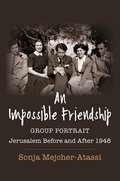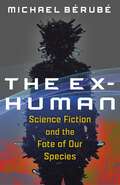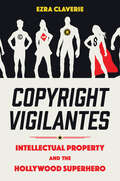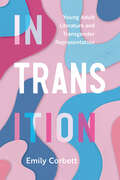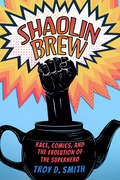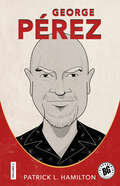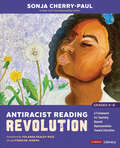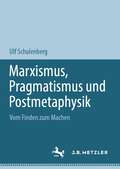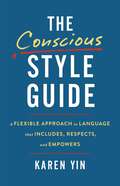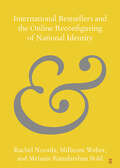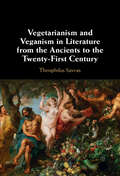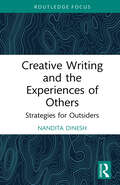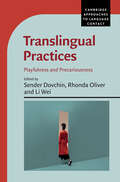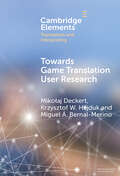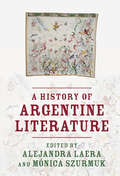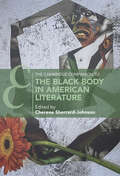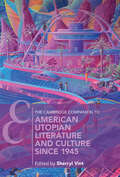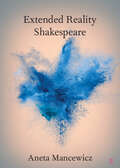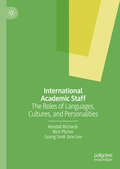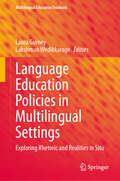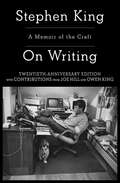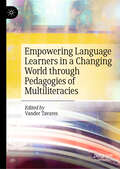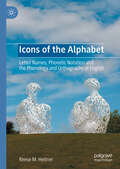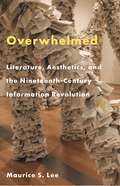- Table View
- List View
An Impossible Friendship: Group Portrait, Jerusalem Before and After 1948 (Religion, Culture, and Public Life #47)
by Sonja Mejcher-AtassiIn Jerusalem, as World War II was coming to an end, an extraordinary circle of friends began to meet at the bar of the King David Hotel. This group of aspiring artists, writers, and intellectuals—among them Wolfgang Hildesheimer, Jabra Ibrahim Jabra, Sally Kassab, Walid Khalidi, and Rasha Salam, some of whom would go on to become acclaimed authors, scholars, and critics—came together across religious lines in a fleeting moment of possibility within a troubled history. What brought these Muslim, Jewish, and Christian friends together, and what became of them in the aftermath of 1948, the year of the creation of the State of Israel and the Palestinian Nakba?Sonja Mejcher-Atassi tells the story of this unlikely friendship and in so doing offers an intimate cultural and social history of Palestine in the critical postwar period. She vividly reconstructs the vanished social world of these protagonists, tracing the connections between the specificity of individual lives and the larger contexts in which they are embedded. In exploring this ecumenical friendship and its artistic, literary, and intellectual legacies, Mejcher-Atassi demonstrates how social biography can provide a picture of the past that is at once more inclusive and more personal. This group portrait, she argues, allows us to glimpse alternative possibilities that exist within and alongside the fraught history of Israel/Palestine. Bringing a remarkable era to life through archival research and nuanced interdisciplinary scholarship, An Impossible Friendship unearths prospects for historical reconciliation, solidarity, and justice.
The Ex-Human: Science Fiction and the Fate of Our Species
by Michael BérubéFacing threats like climate change and nuclear warfare, science fiction authors have conjured apocalyptic scenarios of human extinction. Can such gloomy fates help us make sense of our contemporary crises? How important is the survival of our species if we wind up battling for an Earth that has become an unhabitable hellscape? What other possible futures do narratives of the end of humanity allow us to imagine?Michael Bérubé explores the surprising insights of classic and contemporary works of SF that depict civilizational collapse and contemplate the fate of Homo sapiens. In a lively, conversational style, he considers novels by writers including Ursula K. Le Guin, Margaret Atwood, Liu Cixin, Philip K. Dick, and Octavia Butler, as well as films that feature hostile artificial intelligence, such as 2001: A Space Odyssey, Blade Runner, and the Terminator and Matrix franchises. Bérubé argues that these works portray a future in which we have become able to see ourselves from the vantage point of something other than the human. Though framed by the possibility of human extinction, they are driven by a vision of the “ex-human”—a desire to imagine that another species is possible. For all science fiction readers worried about the fate of humanity, The Ex-Human is an entertaining yet sobering account of how key novels and films envision the world without us.
Copyright Vigilantes: Intellectual Property and the Hollywood Superhero
by Ezra ClaverieCopyright Vigilantes: Intellectual Property and the Hollywood Superhero explains superhero blockbusters as allegories of intellectual property relations. In movies based on characters owned by the comics duopoly of DC and Marvel, no narrative recurs more often than a villain’s attempt to copy the superhero's unique powers. In this volume, author Ezra Claverie explains this fixation as a symptom of the films’ mode of production. Since the 1930s, the dominant American comics publishers have treated the creations of artists and writers as work for hire, such that stories and characters become company property. Thus, publishers avoided sharing the profits both from magazine sales and from licensing characters into other media. For decades, creators have challenged this regime, demanding either shares of profits or outright ownership of their creations. Now that the duopoly rents, licenses, and adapts superheroes for increasingly expensive franchises, and for growing international audiences, any challenge to intellectual property relations threatens a production regime worth billions of dollars. Duopoly movies, therefore, present any attempt to break the superhero’s monopoly on their powers as the scheme of terrorists, mad scientists, or space Nazis—assuaging studio anxieties and revealing the fears of those who benefit most from the real-world ownership of superheroes. Weaving together legal analysis, Marxist political economy, and close readings of movies, Copyright Vigilantes explains the preoccupations of Hollywood’s leading genre.
In Transition: Young Adult Literature and Transgender Representation (Children's Literature Association Series)
by Emily CorbettThe first book-length work of its kind, In Transition: Young Adult Literature and Transgender Representation examines the shift in the young adult book market towards increased representation of transgender characters and authors. Through a comprehensive exploration of historical conventions, genres, character diversity, and ideologies of trans representation, Emily Corbett traces the roots of trans literature from its beginnings in a cisgender-dominated publishing world to the recent rise in trans creators, characters, and implied readers. Corbett describes how trans-ness was initially perceived as an issue to be overcome by cisgender authors and highlights the ways in which the market has changed.Through careful analysis of texts that have until now received little scholarly attention, Corbett weaves together different theoretical approaches and fields of study to provide a map of the textual and cultural histories of this twenty-first-century publishing phenomenon. Focusing on trans authorship, authentic storytelling, and intersectional diversity, this book charts changing public attitudes, the YA book market, and the unique sociocultural moment in which these books are published. In Transition contributes new perspectives on the intersections of adolescence and trans-ness and sheds light on a dynamic subset of YA literature that has yet to receive sustained analysis.
Shaolin Brew: Race, Comics, and the Evolution of the Superhero
by Troy D. SmithShaolin Brew: Race, Comics, and the Evolution of the Superhero looks at how the comic book industry developed from a white perspective and how minority characters were and are viewed through a stereotypical white gaze. Further, the book explores how voices of color have launched a shift in the industry, taking nonwhite characters who were originally viewed through a white lens and situating them outside the framework of whiteness. The financial success of Blaxploitation and Kung Fu films in the early 1970s led to major comics publishers creating, for the first time, Black and Asian superhero characters who headlined their own comics. The introduction of Black and Asian main characters, who previously only served as guest stars or sidekicks, launched a new kind of engagement between comics companies and minority characters and readers. However, scripted as they were by white writers, these characters were mired in stereotypes. Author Troy D. Smith focuses on Asian, Black, and Latinx representation in the comic industry and how it has evolved over the years. Smith explores topics that include Orientalism, whitewashing, Black respectability politics, the model minority myth, and political controversies facing fandoms. In particular, Smith examines how fans take the superheroes they grew up with—such as Luke Cage, Black Lightning, and Shang Chi—and turn them into the characters they wished they had as children. Shaolin Brew delves into the efforts of fans of color who urged creators to make these characters more realistic. This refining process increased as more writers and artists of color broke into the industry, bringing their own perspectives to the characters. As many of these characters transitioned from page to screen, a new generation of writers, artists, and readers have cooperated to evolve one-dimensional stereotypes into multifaceted, dynamic heroes.
George Pérez (Biographix #6)
by Patrick L. HamiltonBorn in the South Bronx to Puerto Rican parents, artist and writer George Pérez (1954–2022) cut his teeth in the 1970s as an artist at Marvel who worked on lesser titles like The Deadly Hands of Kung Fu and Creatures on the Loose, and then mainstays like Fantastic Four and The Avengers. In the 1980s, Pérez jumped ship to DC where he helped turn The New Teen Titans into a top-selling title and cocreated Crisis on Infinite Earths, which marked the publisher’s fiftieth anniversary and consolidated its sprawling universe. As writer and artist, Pérez relaunched DC’s Wonder Woman, a run that later inspired much of the 2017 film.Though Pérez’s style is highly recognizable, his contributions to comic art and history have not been fully acknowledged. In George Pérez, author Patrick L. Hamilton addresses this neglect, first, by discussing Pérez’s artistic style within the context of Bronze Age superhero art, and second, by analyzing Pérez’s work for its representations of race, disability, and gender. Though he struggled with deadlines and health issues in the 1990s, Pérez would reintroduce himself and his work to a new generation of comics fans with a return to Marvel’s The Avengers, as well as attempts at various creator-owned comics, the last of these being Sirens from Boom! Studios in 2014. Throughout his career, Pérez established a dynamic and minutely detailed style of comic art that was both unique and influential.
Antiracist Reading Revolution [Grades K-8]: A Framework for Teaching Beyond Representation Toward Liberation (Corwin Literacy)
by Sonja Cherry-Paul"When can we move beyond representation to liberation?" This question from a young Black girl moved New York Times #1 bestselling author Dr. Sonja Cherry-Paul to offer a vision for antiracist teaching that goes far beyond adding diverse texts in a classroom library. Antiracist Reading Revolution provides an actionable antiracist teaching framework and models how K-8 educators can create opportunities for transformative reading and discussions in classrooms. Dr. Cherry-Paul offers six critical lenses that help educators to adopt an antiracist teaching stance, spotlighting the importance of instruction built around love, joy, community, justice, and solidarity. Educators are invited to reflect on their instructional practices, dismantle ideologies that are barriers to students’ critical and creative thinking and cultivate identity-inspiring learning experiences where students can show up fully as themselves and recognize the full humanity of all people. This is what it means to move beyond representation to liberation. Chapters feature several children’s books that center BIPOC characters and creators. Dr. Cherry-Paul provides prompts and pathways for each children’s book that guide teachers toward putting into action the six critical lenses at the core of the Antiracist Reading Framework – affirmation, awareness, authorship, atmosphere, activism, and accountability. And she provides toolkits for students and teachers to use when selecting and reading books on their own. Chapters in this book also … Offer personal and insightful anecdotes, supported by research and scholarship, that illustrate the power of antiracist teaching in working toward equity, justice, and freedom Provide a clear and actionable guide for K-8 literacy educators including classroom teachers, instructional coaches, and librarians Encourage critical reflection, pausing to ask educators to examine their own identities and values, and how these influence their teaching Guide educators toward selecting and teaching with books that center the lived experiences of BIPOC students This book is a call to action. In Dr. Cherry-Paul’s words, "In an antiracist classroom, reading helps us to dream, experience joy, engage in collective struggle, liberate our minds, and love. Let’s move forward together to realize our vision of an antiracist reading classroom rooted in love and liberation."
Antiracist Reading Revolution [Grades K-8]: A Framework for Teaching Beyond Representation Toward Liberation (Corwin Literacy)
by Sonja Cherry-Paul"When can we move beyond representation to liberation?" This question from a young Black girl moved New York Times #1 bestselling author Dr. Sonja Cherry-Paul to offer a vision for antiracist teaching that goes far beyond adding diverse texts in a classroom library. Antiracist Reading Revolution provides an actionable antiracist teaching framework and models how K-8 educators can create opportunities for transformative reading and discussions in classrooms. Dr. Cherry-Paul offers six critical lenses that help educators to adopt an antiracist teaching stance, spotlighting the importance of instruction built around love, joy, community, justice, and solidarity. Educators are invited to reflect on their instructional practices, dismantle ideologies that are barriers to students’ critical and creative thinking and cultivate identity-inspiring learning experiences where students can show up fully as themselves and recognize the full humanity of all people. This is what it means to move beyond representation to liberation. Chapters feature several children’s books that center BIPOC characters and creators. Dr. Cherry-Paul provides prompts and pathways for each children’s book that guide teachers toward putting into action the six critical lenses at the core of the Antiracist Reading Framework – affirmation, awareness, authorship, atmosphere, activism, and accountability. And she provides toolkits for students and teachers to use when selecting and reading books on their own. Chapters in this book also … Offer personal and insightful anecdotes, supported by research and scholarship, that illustrate the power of antiracist teaching in working toward equity, justice, and freedom Provide a clear and actionable guide for K-8 literacy educators including classroom teachers, instructional coaches, and librarians Encourage critical reflection, pausing to ask educators to examine their own identities and values, and how these influence their teaching Guide educators toward selecting and teaching with books that center the lived experiences of BIPOC students This book is a call to action. In Dr. Cherry-Paul’s words, "In an antiracist classroom, reading helps us to dream, experience joy, engage in collective struggle, liberate our minds, and love. Let’s move forward together to realize our vision of an antiracist reading classroom rooted in love and liberation."
Marxismus, Pragmatismus und Postmetaphysik: Vom Finden zum Machen
by Ulf SchulenbergVom Finden zum Machen bietet die erste ausführliche Diskussion über die Beziehung zwischen Marxismus und Pragmatismus. Diese beiden Philosophien der Praxis sind nicht unvereinbar, und eine Analyse ihrer Beziehung hilft, beide besser zu verstehen. Im Rahmen eines transatlantischen theoretischen Dialogs werden in diesem Buch Gemeinsamkeiten und Unterschiede zwischen diesen Philosophien erörtert. Es handelt sich um eine interdisziplinäre Studie, die Philosophie, amerikanische und europäische Geistesgeschichte und Literaturwissenschaft zusammenführt. Schulenbergs Buch zeigt, dass der Versuch, die Dialektik von Marxismus und Pragmatismus zu erhellen, ein guter Ausgangspunkt ist, wenn wir das unvollendete Projekt der Etablierung einer wirklich postmetaphysischen Kultur weiterführen wollen. Das Buch bietet detaillierte Diskussionen über Sidney Hook, Georg Lukács, Theodor W. Adorno, Fredric Jameson, W.E.B. Du Bois, John Dewey, Richard Rorty und Jacques Rancière.Die Übersetzung wurde mit Hilfe von künstlicher Intelligenz durchgeführt. Eine anschließende menschliche Überarbeitung erfolgte vor allem in Bezug auf den Inhalt.
The Conscious Style Guide: A Flexible Approach to Language That Includes, Respects, and Empowers
by Karen YinA timeless, indispensable guide for anyone who wants to communicate with sensitivity and compassion. Most of us want to choose inclusive, respectful, and empowering language. But language—and how we use it—continually evolves, along with cultural norms. When contradictory opinions muddle our purpose, how do we align our word choices with our beliefs? Who has the final say when people disagree? And why is it so hard to let go of certain words? Afraid of getting something wrong or offending, we too often treat words as dos or don&’ts, regardless of context and nuance. Thankfully, in The Conscious Style Guide, award-winning editor Karen Yin provides a road map for writing and speaking with equity in mind—no matter how the world around us changes. Readers will learn: How to identify biased language How to use inclusive language to bring attention to specific groups of people How to adopt conscious language as a tool for self-awareness and critical thinking How to make digital materials more accessible, from event flyers to websites How to alleviate the stress of experiencing exclusionary language How to collaborate with others and work across differences How to create a style sheet to help support your practice And much more With practical advice and hundreds of relatable examples, The Conscious Style Guide invites us to challenge binary thinking, embrace flexibility and creativity, and explore truly effective communication—in all aspects of our lives.
International Bestsellers and the Online Reconfiguring of National Identity (Elements in Publishing and Book Culture)
by null Rachel Noorda null Millicent Weber null Melanie Ramdarshan BoldInternational bestsellers are the ideal sites for examining the complicated relationship between literary culture and national identity. Despite the transnational turns in both literary studies and book history, place is still an important configurer of twenty-first-century book reception. Books are crucial to national identity and catalysts of nationalist movements. On an individual level, books enable readers to shape and maintain their own national identities. This Element explores how contemporary readers' understandings of nation, race/ethnicity, gender, and class continue to shape their reading, using as case studies the online reception of three bestseller titles-Liane Moriarty's Big Little Lies (Australia), Zadie Smith's NW (UK), and Kevin Kwan's Crazy Rich Asians (USA). In doing so, this Element demonstrates the need for and articulates a transnational conceptualisation of the relationship between reader identity and reception.
Vegetarianism and Veganism in Literature from the Ancients to the Twenty-First Century
by null Theophilus SavvasVegetarianism and Veganism in Literature from the Ancients to the Twenty-First Century re-assesses both canonical and less well-known literary texts to illuminate how vegetarianism and veganism can be understood as literary phenomena, as well as dietary and cultural practices. It offers a broad historical span ranging from ancient thinkers and writers, such as Pythagoras and Ovid, to contemporary novelists, including Ruth L. Ozeki and Jonathan Franzen. The expansive historical scope is complemented by a cross-cultural focus which emphasises that the philosophy behind these diets has developed through a dialogic relationship between east and west. The book demonstrates, also, the way in which carnivorism has functioned as an ideology, one which has underpinned actions harmful to both human and non-human animals.
Creative Writing and the Experiences of Others: Strategies for Outsiders (Routledge Focus on Literature)
by Nandita DineshIn times that are rife with complex manifestations of identity politics, writing classrooms across the world are hosting heated debates about what it means for authors to write about experiences outside their own. This book focuses on writing as the act of witnessing when the writers themselves were not present to witness in person. It seeks to answer the questions that come along with these experiences, such as what might it mean to write in order “to watch,” “to try and understand,” “to never look away,” and “to never forget” when the writer is an outsider to an experience? What might it mean to write about others in ways that do not essentialize or sensationalize, and in ways that are as humble, ethical, and responsible as possible? What might it mean to bear witness through the written word while engaged in a constant (re)negotiation with one’s own positioning i.e., to cultivate a condition of critical empathy that doesn’t also have the consequence of creative paralysis?
Translingual Practices: Playfulness and Precariousness (Cambridge Approaches to Language Contact)
by Li Wei Sender Dovchin Rhonda OliverBringing together work from a team of international scholars, this groundbreaking book explores how language users employ translingualism playfully, while, at the same time, negotiating precarious situations, such as the breaking of social norms and subverting sociolinguistic boundaries. It includes a range of ethnographic studies from around the globe, to provide us with insights into the everyday lives of language users and learners and their lived experiences, and how these interact in translingual practices. A number of mixed methodological frameworks are included to study language users' behaviours, experiences and actions, cover the complexity of language evolutionary processes, and ultimately show that precarity is as fundamental to translingualism as playfulness. It points to a future research direction in which research should be pragmatically applied into real pedagogical actions by revealing the sociolinguistic realities of translingual users, fundamentally addressing broader issues of racism, social injustice, language activism and other human rights issues.
Towards Game Translation User Research (Elements in Translation and Interpreting)
by null Mikołaj Deckert null Krzysztof W. Hejduk null Miguel Á. Bernal-MerinoThis Element takes the initiative to highlight the nascent state of audiovisual translation research centring on users of video games. It proposes ways of advancing the research by integrating numerous related perspectives from relevant fields to guide studies in translated game reception into further fruition. The Element offers an accessible overview of possible relationships between translation and its experiencers, showcasing ways to design game reception studies. Examples, methods, tools, and practical concerns are discussed to ultimately develop a blueprint for game translation user research which aims to consolidate scientific user-centric inquiry into video game translation. To that end, the blueprint captures the three-pronged interplay between the parameters of localisation-reception research in facets of user experience, facets of translated games, and facets of game users.
A History of Argentine Literature
by Mónica Szurmuk Alejandra LaeraArgentine Literature continues to figure prominently in academic programs in the English-speaking world, and it has an increasing presence in English translation in international prizes and trade journals. A History of Argentine Literature proposes a major reimagining of Argentine literature attentive to production in indigenous and migration languages and to current debates in Literary Studies. Panoramic in scope and incisive in its in-depth studies of authors, works, and theoretical problems, this volume builds on available scholarship on canonical works but opens up the field to include a more diverse rendering as well as engaging with the full spectrum of textual interventions from travel writing to drama, from popular 'gauchesca' to celebrated avant guard works Working at the crossroads of disciplines, languages and critical traditions, this book accounts for the wealth of Argentine cultural production and maps the rich, diverse and often overlooked history of Argentine literature.
The Cambridge Companion to the Black Body in American Literature (Cambridge Companions to Literature)
by Cherene Sherrard-JohnsonWhether invisible or hyper-visible, adored or reviled, from the inception of American literature the Black body has been rendered in myriad forms. This volume tracks and uncovers the Black body as a persistent presence and absence in American literature. It provides an invaluable guide for teachers and students interested in literary and artistic representations of Blackness and embodiment. The book is divided into three sections that highlight Black embodiment through conceptual flashpoints that emphasize various aspects of human body in its visual and textual manifestations. This Companion engages past and continuing debates about the nature of embodiment by showcasing how writers from multiple eras and communities defined and challenged the limits of what constitutes a body in relation to human and nonhuman environment.
The Cambridge Companion to American Utopian Literature and Culture since 1945 (Cambridge Companions to Literature)
by Sherryl VintProviding a comprehensive overview of American thought in the period following World War II, after which the US became a global military and economic leader, this book explores the origins of American utopianism and provides a trenchant critique from the point of view of those left out of the hegemonic ideal. Centring the voices of those oppressed by or omitted from the consumerist American Dream, this book celebrates alternative ways of thinking about how to create a better world through daily practices of generosity, justice, and care. The chapters collected here emphasize utopianism as a practice of social transformation, not as a literary genre depicting a putatively perfect society, and urgently make the case for why we need utopian thought today. With chapters on climate change, economic justice, technology, and more, alongside chapters exploring utopian traditions outside Western frameworks, this book opens a new discussion in utopian thought and theory.
Extended Reality Shakespeare (Elements in Shakespeare Performance)
by null Aneta MancewiczThis Element argues for the importance of extended reality as an innovative force that changes the understanding of theatre and Shakespeare. It shows how the inclusion of augmented and virtual realities in performance can reconfigure the senses of the experiencers, enabling them to engage with technology actively. Such engagements can, in turn, result in new forms of presence, embodiment, eventfulness, and interaction. In drawing on Shakespeare's dramas as source material, this Element recognises the growing practice of staging them in an extended reality mode, and their potential to advance the development of extended reality. Given Shakespeare's emphasis on metatheatre, his works can inspire the layering of environments and the experiences of transition between the environments both features that distinguish extended reality. The author's examination of selected works in this Element unveils creative convergences between Shakespeare's dramaturgy and digital technology.
International Academic Staff: The Roles of Languages, Cultures, and Personalities
by Nick Pilcher Kendall Richards Gyung Sook LeeThis book focuses on the experiences of international academic staff in higher education, particularly examining the influences of issues such as languages, cultures, and personalities. The qualitative approach taken by the authors provides vignettes of varied international contexts, which are then compared and analysed to highlight important considerations for practice in different settings. By exploring the experiences of staff teaching within a language that is not their first language, and in a different cultural context, the authors contribute to a burgeoning area of research, and scholars working on Applied Linguistics, Higher Education, English as a Medium of Instruction and other aspects of Internationalisation are likely to find the book relevant and useful.
Language Education Policies in Multilingual Settings: Exploring Rhetoric and Realities in Situ (Multilingual Education Yearbook)
by Laura Gurney Lakshman WedikkarageThe volume provides grounded and contemporary insight into multilingual education from diverse perspectives – stemming from the authors' epistemic, cultural and geographic positioning around the world in different educational milieu – and will give both academic and practitioner audiences an up-to-date picture of multilingual education in the early 2020s. Multilingual education policies are continually implemented, re-evaluated and debated around the world, from primary to tertiary education. Fundamentally, however, educational policies manifest in classroom practice; the language envisaged in policy becomes the languaging of practice as teachers, learners and stakeholders negotiate educational curricula together. Internal and external forces – from resourcing to the Internet, to broader events such as pandemics and changes in government – shape the landscapes in which policies are enacted. The volume is extending the themes of the Multilingual Education Yearbook series in line with current developments in theory, research and practice. As such, this book provides a wealth of information to practitioners (teachers and teacher educators), researchers in applied linguistics and language education, postgraduate students in the field of applied linguistics, and policymakers.
On Writing: A Memoir Of The Craft
by Stephen KingTwentieth Anniversary Edition with Contributions from Joe Hill and Owen KingONE OF TIME MAGAZINE&’S TOP 100 NONFICTION BOOKS OF ALL TIME Immensely helpful and illuminating to any aspiring writer, this special edition of Stephen King&’s critically lauded, million-copy bestseller shares the experiences, habits, and convictions that have shaped him and his work. &“Long live the King&” hailed Entertainment Weekly upon publication of Stephen King&’s On Writing. Part memoir, part master class by one of the bestselling authors of all time, this superb volume is a revealing and practical view of the writer&’s craft, comprising the basic tools of the trade every writer must have. King&’s advice is grounded in his vivid memories from childhood through his emergence as a writer, from his struggling early career to his widely reported, near-fatal accident in 1999—and how the inextricable link between writing and living spurred his recovery. Brilliantly structured, friendly and inspiring, On Writing will empower and entertain everyone who reads it—fans, writers, and anyone who loves a great story well told.
Empowering Language Learners in a Changing World through Pedagogies of Multiliteracies
by Vander TavaresThis book presents conceptual and empirical studies on how pedagogies of multiliteracies can empower language learners, teachers, and teacher educators in an increasingly globalized yet unequal world, with a focus on social justice in language education. The chapters offer critical and innovative pedagogical insights that contribute to re-envisioning language and literacy education in the 21st century in a number of educational contexts, including post-secondary, community, refugee, science, language, and teacher education. From a raciolinguistic critique of monoglossic education in the United States to drama-based pedagogies for refugee learners in Iceland, this book contextualizes language learner empowerment by identifying and confronting ideologies of race, gender, nationality, and language. Creative multimodal and multisensorial pedagogies are enacted through learner-designed plurilingual portfolios, infographics, picturebooks, identity texts, performance, andmuseum-based learning. This book diversifies and enriches current approaches to language education based on pedagogies of multiliteracies that cultivate learner agency, identity, and critical reflection, and it will be of interest to readers with backgrounds in second/foreign language education, TESOL/ESL, sociology of education, and applied linguistics.
Icons of the Alphabet: Letter Names, Phonetic Notation and the Phonology and Orthography of English
by Reese M. HeitnerThis book examines the names by which we refer to the letters of the English alphabet, arguing that these letter names provide unrivalled insights into the phonological structure of English, present and past, as well as the many peculiarities of English pronunciation and spelling. Classified either as contronyms, ambinyms or tautonyms, the modern phonological profiles of our ancient Semitic letter names reveal what is unique to English, what is fundamental to language and how letter names emerge as the semiotic product of interchanging languages combined with intralanguage change. This volume promises a much more extensive and deeper linguistic treatment of English letter names than has previously been attempted. It will be of particular interest to students and scholars of historical linguistics, phonology and orthography, the history of English, semiotics, and language and literacy teaching.
Overwhelmed: Literature, Aesthetics, and the Nineteenth-Century Information Revolution
by Professor Maurice S. LeeAn engaging look at how debates over the fate of literature in our digital age are powerfully conditioned by the nineteenth century's information revolutionWhat happens to literature during an information revolution? How do readers and writers adapt to proliferating data and texts? These questions appear uniquely urgent today in a world of information overload, big data, and the digital humanities. But as Maurice Lee shows in Overwhelmed, these concerns are not new—they also mattered in the nineteenth century, as the rapid expansion of print created new relationships between literature and information.Exploring four key areas—reading, searching, counting, and testing—in which nineteenth-century British and American literary practices engaged developing information technologies, Overwhelmed delves into a diverse range of writings, from canonical works by Coleridge, Emerson, Charlotte Brontë, Hawthorne, and Dickens to lesser-known texts such as popular adventure novels, standardized literature tests, antiquarian journals, and early statistical literary criticism. In doing so, Lee presents a new argument: rather than being at odds, as generations of critics have viewed them, literature and information in the nineteenth century were entangled in surprisingly collaborative ways.An unexpected, historically grounded look at how a previous information age offers new ways to think about the anxieties and opportunities of our own, Overwhelmed illuminates today’s debates about the digital humanities, the crisis in the humanities, and the future of literature.
